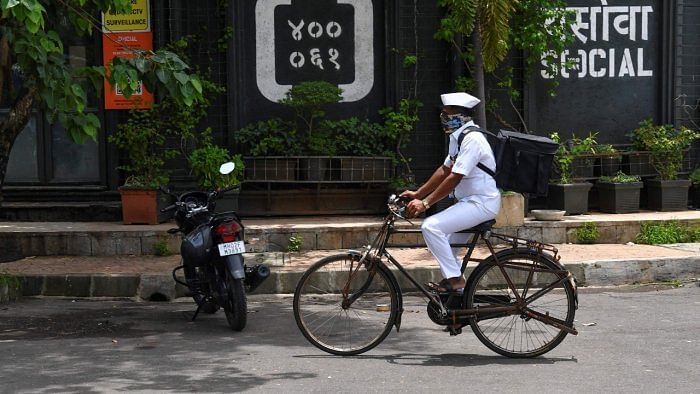
The iconic Dabbawalas of Mumbai have stressed on the need for cycling lanes in the financial capital of the country and safe parking spaces for their cycles, which is their primary mode of transport for tiffin delivery, to prevent theft and damage.
In a perception survey of Mumbai’s iconic Dabbawalas conducted by Waatavaran Foundation and supported by Sustainable Mobility Network (SMN), it was found that 89 per cent respondents want dedicated cycling lanes and 100 per cent call for parking spaces.
The survey, which was conducted among 220 out of 500 dabbawalas across nine neighbourhoods of Mumbai, aimed to understand the state of cycling infrastructure and the challenges faced by Dabbawalas while making deliveries.
“The survey shows that 92 per cent of all the respondents from dabbawalas use cycles as their primary mode of transport (first mode of transport). The survey also shows the Dabbawalas' commitment to clean air and their progressive stand of urging other last mile delivery partners to opt for bicycles,” said Maharashtra Legislative Assembly Speaker Rahul Narwekar.
He also urged authorities, state government and government agencies, working on the issue of climate change to take note of the report and initiate appropriate measures to assist the iconic dabbawalas in their delivery and to contribute the efforts to reduce carbon emission.
Making a strong case for clean and sustainable deliveries, 86 per cent of Dabbawalas believed that deliveries on cycles will improve air quality, while 71 per cent wanted all last mile deliveries to take place on cycles.
“The survey's results show that in order to reduce emissions in Mumbai's delivery industry, the Dabbawala community needs considerable support. More case studies like the Dabbawalas should come forward to work closely with our government to guarantee secure parking spaces, inclusive infrastructure, and dedicated cycling lanes. There is an urgent need to decarbonise the last mile delivery industry and dabbawalas are showing the way,” said Bhagwan Kesbhat, CEO of Waatavaran.
"Making Mumbai a cycle inclusive infrastructure city will definitely motivate others to opt for cycle to work, especially other last mile delivery partners. Although we understand the challenges in the city, things like creating parking space for bicycles is easier unlike motorised vehicles. We are hopeful that the government will support us to sustain the use of bicycles,” said Ulhas Muke, President of Mumbai Dabbawalas Association.
Savings on fuel, ease of manoeuvrability on roads, less need for parking space in comparison to motor vehicles, and health benefits were the key advantages of cycling according to most Dabbawalas.
Talking about the challenges they are facing daily while cycling, 75 per cent of respondents said that road traffic is a major concern as it affects their efficiency, while road safety is a cause for concern for all cyclists.
Since local trains are the second most crucial mode of transport for Dabbawalas, 68 per cent respondents said railway infrastructure should be cycle inclusive. Dabbawalas cited that separate wagons and ramps will be helpful for transporting cycles and tiffin at railway stations.